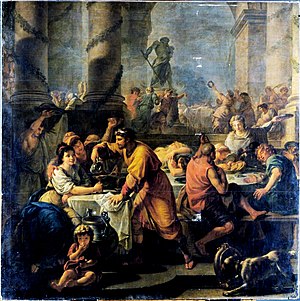
Back ساتورن (عيد) Arabic Saturnales AST Сатурналіі Byelorussian Сатурналии Bulgarian স্যাটার্নেলিয়া Bengali/Bangla Saturnals Catalan Saturnálie Czech Saturnalia Danish Saturnalien German Σατουρνάλια Greek
| Saturnalia | |
|---|---|
 Saturnalia (1783) by Antoine-François Callet, showing his interpretation of what the Saturnalia might have looked like | |
| Observed by | Romans |
| Type | Classical Roman religion |
| Significance | Public festival |
| Celebrations | Feasting, role reversals, gift-giving, gambling |
| Observances | Public sacrifice and banquet for the god Saturn; universal wearing of the pileus |
| Date | 17–23 December |
Saturnalia is an ancient Roman festival and holiday in honour of the god Saturn, held on 17 December of the Julian calendar and later expanded with festivities through 19 December. By the 1st century B.C., the celebration had been extended through 23 December, for a total of seven days of festivities. The holiday was celebrated with a sacrifice at the Temple of Saturn, in the Roman Forum, and a public banquet, followed by private gift-giving, continual partying, and a carnival atmosphere that overturned Roman social norms: gambling was permitted, and masters provided table service for their slaves as it was seen as a time of liberty for both slaves and freedmen alike.[1] A common custom was the election of a "King of the Saturnalia", who gave orders to people, which were followed and presided over the merrymaking. The gifts exchanged were usually gag gifts or small figurines made of wax or pottery known as sigillaria. The poet Catullus called it "the best of days".[2]
Saturnalia was the Roman equivalent to the earlier Greek holiday of Kronia, which was celebrated during the Attic month of Hekatombaion in late midsummer. It held theological importance for some Romans, who saw it as a restoration of the ancient Golden Age, when the world was ruled by Saturn. The Neoplatonist philosopher Porphyry interpreted the freedom associated with Saturnalia as symbolizing the "freeing of souls into immortality". Saturnalia may have influenced some of the customs associated with later celebrations in western Europe occurring in midwinter, particularly traditions associated with Christmas, the Feast of the Holy Innocents, and Epiphany. In particular, the historical western European Christmas custom of electing a "Lord of Misrule" may have its roots in Saturnalia celebrations.
- ^ Miller, John F. "Roman Festivals," in The Oxford Encyclopedia of Ancient Greece and Rome (Oxford University Press, 2010), p. 172.
- ^ Catullus 14.15 (optimo dierum), as cited by Mueller 2010, p. 221
© MMXXIII Rich X Search. We shall prevail. All rights reserved. Rich X Search